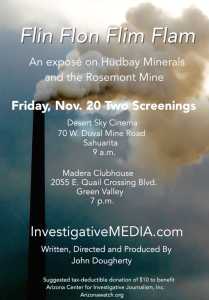Chapter I, Chapter II, Chapter II supplement, Chapter III, Chapter IV, Chapter V, Chapter VI, Chapter VII, Chapter VIII , Chapter IX, Chapter X, Chapter XI, Chapter XII , Chapter XIII, Chapter XIV, Chapter XV, Chapter XVI, Chapter XVII, Chapter XVIII, Chapter XIX and Chapter XX.
Arizona Forestry Division releases Yarnell Hill Fire settlement agreement with Granite Mountain Hotshot survivors
In response to a request by InvestigativeMEDIA under the Arizona Public Records Law, the Arizona Forestry Division today released the settlement agreement between the survivors of the 19 Granite Mountain Hotshots who were killed on June 30, 2013 in the Yarnell Hill Fire.
The agreement was reached last summer but was never publicly released.
The agreement calls for the 12 families that filed a federal wrongful death lawsuit to receive $600,000. Survivors signed off on the agreement between July 6 and July 29, 2015.
The Forestry Division made no admission of liability or wrongdoing in its management of the Yarnell Hill Fire that was sparked by lightening on June 28, 2013. The families dismissed “with prejudice” the federal lawsuit they had filed against the forestry division and its employees.
The agreement requires the forestry division to meet with the Granite Mountain Hotshot families for a full day “to review data and information and to answer questions posed by the families and their consultants/experts.”
The agreement also requires the forestry division to create a “staff ride for the Yarnell Hill Fire and will make its personnel and information it has collected available.”
The settlement also lists a number of requests by the families for the forestry division to implement to improve safety for wildland firefighters.
“The Forester agrees to make good faith effort to implement the items…” the agreement states. “However, all Parties recognize that certain actions are dependent on matters outside the control of the Arizona State Forestry Division and the Forester, including items dependent on budget adjustments, legislative action or adoption by national, regional and local partner agencies and organizations.”
The agreement is here.
Please begin Yarnell Hill Fire Chapter XIX here
Eric Marsh had no cell phone communications in hours before deployment, his widow says
(Story updated at 9:05 a.m., Dec. 21, 2015 to include Amanda Marsh’s statement that Eric Marsh only carried one cell phone.)
By John Dougherty
Granite Mountain Hotshot superintendent Eric Marsh did not make or receive any cell phone calls in the three hours leading up to the burn over that claimed his life along with 18 other members of his crew during the Yarnell Hill Fire on June 30, 2013, his wife Amanda Marsh said Saturday.
The question of whether Marsh was in cell phone communication with fire commanders in the hours leading up to the tragedy has lingered for more than two years after two state investigations failed to examine his cell phone records.
“There was nothing after 1:11 p.m.,” Amanda Marsh said. “That call was with Todd Abel.” Abel was a senior commander directing fire suppression operations.
Abel has told investigators he had a cell phone discussion with Marsh at that time to discuss a disagreement Marsh had with another fire commander.
But the call was about three hours before Granite Mountain moved from a safe zone on a ridge in the Weaver Mountains west of Yarnell and descended into a box canyon where the crew was trapped by flames at about 4:40 p.m.
Nov. 20 Green Valley screenings set for Hudbay Minerals documentary
Three-time Arizona Journalist of the Year John Dougherty will present his documentary “Flin Flon Flim Flam” at two screenings on Nov. 20 in Green Valley.
The 51-minute film reports on Toronto-based miner Hudbay Minerals‘ worldwide operations and the company’s plans for the proposed Rosemont open-pit copper mine in the Santa Rita Mountains on the Coronado National Forest east of Tucson.
https://youtu.be/GgOVVhvGKYs
Dougherty will host a question/answer session following the screenings.
The film will be shown at 9 a.m. at the Desert Sky Cinema, 70 W. Duval Road, in Sahuarita and at 7 p.m. at the Madera Clubhouse, 2055 E. Quail Crossing Road in Green Valley. A suggested donation of $10 will benefit the nonprofit Arizona Center for Investigative Journalism, Inc.
The exposé reveals how Hudbay contaminated its home community in Flin Flon, Manitoba with high levels of heavy metals from a smelter the company operated for more than 80 years.
The documentary also reports on the impact to residents of Hudbay’s former mine in El Estor, Guatemala where the company’s security guards allegedly clashed with residents over land claims. A Mayan community leader was shot to death and another man left paralyzed in the September 2009 violence.
Hudbay is now the target of a three, precedent-setting civil suits in Toronto that have withstood the company’s attempts to have the case thrown out. The cases are proceeding to trial. The cases mark the first time a Canadian company is being held accountable in Canadian courts for the acts of an overseas subsidiary.
Dougherty also reports on demonstrations and community opposition to Hudbay’s recently opened Constancia open pit copper mine in Uchucarco, Peru. Residents in the community were beaten and teargassed by Peruvian National Police wearing rain gear provided by Hudbay Minerals. Residents in the rural community claim Hudbay has reneged on its promises to the community in exchange for rights to the land for the open pit mine.
The film also reports on the environmental destruction that would occur if Hudbay Minerals obtains state and federal permits to construct the Rosemont mine on the northeastern face of the Santa Rita Mountains and the threat to Green Valley’s water supply from Hudbay’s planned groundwater pumping. Hudbay has promised to replace groundwater it pumps from the Santa Cruz River Valley with Central Arizona Project Canal water. Critics, however, cast doubt that Hudbay will be able to fulfill its promise as Colorado River supplies continue to decline.
Pima County Supervisor Ray Carroll criticizes the company for engaging in what he says is a “cover up” and “white collar malfeasance” over Hudbay’s failure to publicly disclose to its shareholders and regulators that its Air Quality Control permit for the Rosemont project was overturned last February by a Maricopa County Superior Court judge.
The film premiered on Oct. 20 at the Loft Cinema in Tucson drawing more than 150 people. The documentary screened a second time at the Loft Cinema on Nov. 1.
This is the second documentary produced by Dougherty on the proposed Rosemont mine project.
The 2012 film “Cyanide Beach” revealed the checkered history of the top executives of Augusta Resource Corporation, the previous owners of the Rosemont mine site.
The film won first place as best educational film at the Yosemite International Film festival and attracted large crowds at screenings across southern Arizona.
Hudbay acquired Augusta in 2014 in a $500 million stock deal.

